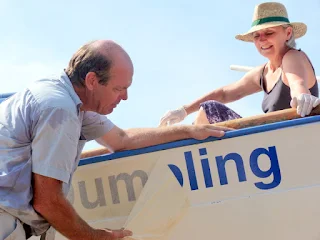Nick Cole, an
Anglo-Australian with strong Algarve
connections, is about to reach a key moment in fulfilling a dream that has been
brewing for six decades.
At an age when
most professional men are looking forward to taking it easy, Nick has taken on a
daunting physical and mental challenge. Having spent virtually every day for
the past six months single-handedly refitting a sailing boat he built by himself
in the 1980s, he is preparing to put her back in the water and set off alone
from Portimão into the wide blue yonder.
His boat is
called Dumpling. Nick delights in her simplicity. Most sailing boats nowadays
are high-tech, luxury items, but Dumpling
has no engine, square sails and is equipped only with basic necessities. She's "green".
Nick's latest
adventure is fostered by a seemingly insatiable wanderlust. Born in Melbourne, Australia, he went off with his parents to Singapore at the age of two. A year later, they took
him to England where his father
set up a dental practice in London’s
Harley Street.
After graduating from Cardiff Dental School,
Nick started his first job - back in Melbourne.
He was soon on his way again, to a string of far-flung locum appointments in Somerset, London (where he
met his wife Sally), the far north of Queensland,
South Australia and Victoria.
He took a break
from dentistry, bought a 45-foot trading boat in Java, sailed her to Bali for a
refit and later “pranged” her on Christmas Island.
After a short
spell working in Charing Cross
Hospital, the intrepid
traveller followed in his father’s footsteps and bought a dental practice in Harley Street. That
was in 1979. A busy decade followed. Sally gave birth to twin boys. Nick
created Dumpling from a design he had
found in a book in a Melbourne
public library. He completed a master’s degree in advanced restorative dentistry
before sailing Dumpling to the south
of Portugal
where he opened a dental practice in Lagoa in 1990.
Six years on, the
twins, David and James, completed their secondary education at the Porches International School.
The family returned to England
so that the boys could go to university. Since then, Nick has worked as a
dentist in various places, all close to the sea: in the port of Plymouth, on St
Helena island in the South Atlantic, Totnes in south Devon, the Isles of Scilly, the Shetland Islands,
North Wales, Scarborough in North Yorkshire, and the Hebrides off the west
coast of Scotland.
His passion for
sailing was aroused as a child by the stories of English author and journalist
Arthur Ransome. His childhood hero was Joshua Slocum, the first person to sail
around the world single-handed. Nick greatly admires Slocum’s qualities: “He was skilled,
brave, enduring, modest, kind, funny.”
So is Nick.
Having sailed dinghies
and small boats from his school days, the design that took his fancy in the
Melbourne library was an 11.6 metre ketch, gaff rigged and with square sails on
the main mast.
After four years
in the building, the voyage on Dumpling
from England to Portugal
in 1989 was most eventful.
Nick recalls with
typical self-deprecation: “I got a bit beaten up in Biscay and felt like a hero
when I dropped anchor just east of Sagres. But I felt like a berk shortly
afterwards when I ran aground off Ferragudo.”
Worse was to come
on a subsequent trip off Portugal’s
south coast. “I went out without checking
the weather forecast and got clobbered. Lost my mast and had to sail back under
jury rig. Tried to get into Portimão but missed. I anchored off Praia da Rocha
but had to be rescued by a Portuguese naval patrol boat.”
Dumpling has been standing propped up on a grassy
patch in the Cole’s rural home near Silves ever since.
Over the past
four years, Nick has periodically taken time off from private practise in the UK to restore
her, always on a tight budget. Crucially,
he has enjoyed the unrelenting understanding and endorsement of his wife and
sons. Dumpling now has a fully repaired
hull, new masts, better accommodation, a proper galley and a ‘head’ that
works well.

It was on the remote
island of St Helena that he came up with the idea
of getting back to an old-fashioned unpowered sailing boat with a hold for transporting
traditional cargoes. All rather arcane and looked down upon by those who spend
most of their time anchored in expensive marinas, but Nick has incorporated
most of his fundamental ideas. Dumpling has no way of going anywhere
without wind in her sails. Her navigation lights will be powered by a solar
panel but all other lighting will come from paraffin lamps, candles or a head
torch. While a small GPS will be on hand for emergencies, he will navigate by
the sun and the stars - just like his hero Joshua Slocum.
Dumpling will be back in the water next week and
departing - first stop Madeira – a few days
later. Initially anyway, Nick does not plan to sail around the world like
Slocum. But who knows?
* We will report on the final preparations in our next blog and keep
track of Dumpling’s progress thereafter.










